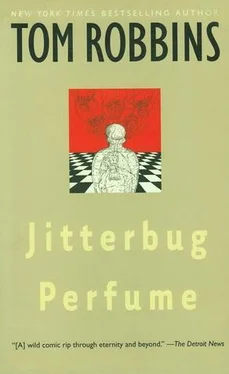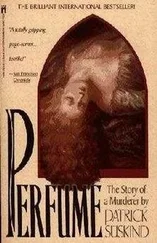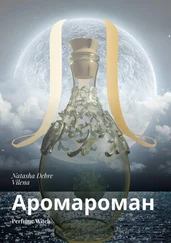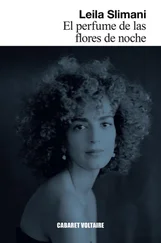The least wrinkled garment — and even it had as many folds as the waddles of a Republican president — in her closet was a green knit dress given to her by her ex-husband, the Argentine accordion ace, Effecto Partido. She hung it in the bathroom with the shower on hot and full, until the steam performed the equivalent of one of those partially successful face-lifts administered to aging actresses. The dress looked good on her. It called attention to the violet in her eyes. She applied eye shadow and lipstick and as a finishing touch, forced earring wires through the virtually grown-over holes in her lobes. The earrings were also a gift from Effecto. They were tiny accordions.
With a tingle of excitement, she decided to call for a taxi. The Last Laugh Foundation was only a dozen blocks away, but it was raining, as usual, and she just couldn't ride her bike in her best dress. She turned the latch, checking twice to ascertain that the door was tightly locked, then went downstairs to wait for the cab. “If a beet comes tonight, that carnivore Ricki can deal with it,” she said. She was chuckling softly when she climbed into the Farwest taxi.
The cab streaked through the wet streets with a noise like an asp. Alas, before Priscilla could fully enjoy the blur of neon, the crisp vinyl upholstery, the mystery crackle of the two-way radio, she was at her destination. She showed her invitation to one of a half-dozen security guards — triple the usual number — and was immediately let through the iron gate, while from the excluded crowd that spilled out front, even in the chilly drizzle that was falling there arose loud grumbles and cries of “Who the hell is she?” Her lungs filled momentarily with a sort of golden gas, that righteous helium that inflates the diaphragm of any honest person who finds himself or herself suddenly one of an elite. Slightly giddy with privilege, she stumbled along a gravel path that wound through a rhododendron garden and led to the front steps of the mansion. She was beginning to have visions of Wally Lester's Mexican palace. They ceased when she noticed a squashed slug on the steps.
The brass door-knocker was in the shape of a fairy. Little wings and wand and everything. “Hmm,” said Priscilla. She thought that she would feel silly, putting it to its intended purpose, but it was okay. She was still regarding the knocker when a girl about eight years old opened the door and admitted her. “My daddy believes in fairies,” the child said. “Hmm,” replied Priscilla.
Although the ivy-covered exterior of the Last Laugh Foundation led one to expect brown leather furniture, worn but expensive Oriental carpets, carved wood ceilings, and Flemish tapestries depicting medieval stag hunts or mythological rowdies, the interior proved to be bright and modern: chrome, smoked glass, canvas couches in bold primary hues. The floors were polished hardwood. The walls were pure white. “White as alkaloid crystals,” Wiggs Dannyboy was to say. “White as yeti dung, white as the Sabbath, white as God's own belly. Floral patterns, they're for your doomed. Your immortalist wall is a white one.” Here and there were prints by M. C. Escher, a multiplication of stiff, metamorphic images that assured the viewer that the world is a puzzle and life a loop and that is that. (Escher is sneered at by critics, but he may be one of the few artists who didn't lie to us.) Above the fireplace, in which Pres-to-logs were smoldering, was a display of headhunting equipment, probably relics of the days when Dr. Dannyboy was a working anthropologist. “Would you care for a cocktail?” the little girl asked. You bet.
Standing about the large room were approximately twenty people, none of whom seemed any more at home there than Priscilla. She thought she recognized one of the guests. He was, oddly enough, a fragrance wholesaler, the only one in the Pacific Northwest. She had made modest purchases from him. It was he who would order French jasmine oil for her, if the educated waitresses did, indeed, grant her the funds with which to buy it. She was about to approach him, gulping bourbon and ginger ale all the while, when Dr. Dannyboy fairly burst into the room, introduced himself loudly, and called the gathering to table.
The dining room was formal in character, despite the fact that its long table was made of red plastic, the chairs of chrome tubes and purple canvas. The walls here were white, as well, adorned by another Escher or two, commenting again on the poetic transformations that occur systematically, if mysteriously, in the seemingly endless loop of life. Candles blazed in a plastic candelabrum. The last chrysanthemums of autumn hung their heads apprehensively over the rim of a vase, like voyagers whose crowded boat was steaming into a strange and possibly dangerous port. The chrysanthemums were part of a centerpiece that included some beets.
Priscilla failed to notice the beets right away. Her gaze was concentrated upon Dr. Dannyboy. That a one-eyed man of fifty could be so handsome! Dannyboy was slender, svelte, and nimble, a tanned, athletic man with an Airstream nest of silver curls, teeth like the spots on dominoes, and more twinkle in his single eye than most men have in a pair. A high-voltage blue, the eye color was in aesthetic contrast to the patch that he wore on the right side, the patch being white vinyl with a painted green shamrock in its center. Priscilla had seen photographs of him, of course, taken both before and after he lost his eye, but they had barely hinted at the charm that spilled out of him like foam out of an ale mug.
Of his background, she knew a little. Brilliant young anthropologist who left his native Dublin to teach at Harvard, where he experimented with mind-altering chemicals beyond the call of academic duty. Lost his professorship, journeyed to the Amazon to munch vision vine with the Indians, returning to the United States as a self-styled psychedelic prophet, or “electronic shaman,” as he called himself, appearing on TV talk shows, lecturing on campuses everywhere, promoting with considerable flair the notion that certain drugs can raise consciousness and that persons with elevated consciousness are less apt to be violent, greedy, fearful, or repressed. Since it was hardly in the best national interest to relieve citizens of their violence, greed, fear, or repression, the government acted to silence Dr. Dannyboy by arresting him on a phony marijuana charge and checking him into the steel hotel. Escaped, only to be nabbed two years later on a Costa Rican orchid farm, and imprisoned again. Paroled after nearly a decade, during which time he lost an eye to a sadistic prison guard and impregnated his wife by smuggling out his semen in a dinner roll. Turned up in Seattle a couple of years back to quietly (for him) found an institution devoted to “immortality and longevity research.”
All this Priscilla knew, but it seemed to have nothing to do with the attractive man who sat at the head of the table in Irish tweeds, sipping red wine, tapping from time to time his garish eye patch with his salad fork, and holding forth on a variety of topics. “England!” she heard him bellow with distaste. “How can a country that cannot produce ice cubes in abundance be hopin' to palm itself off as a major civilization?” Moments later, he had turned his attention to grammar: “There are no such things as synonyms!” he practically shouted. “Deluge is not the same as flood!” After each of these pronouncements, he erupted with laughter, almost as if making fun of what he'd just so passionately proclaimed.
At the other end of the table, acting as hostess, was Dannyboy's young daughter, Huxley Anne. Priscilla sat to Huxley Anne's left. The place directly across from Priscilla was vacant. “There was a colored woman supposed to eat there,” volunteered Huxley Anne, “but she didn't come. Maybe she's late. She lives long away.” The place to the right of Dannyboy was likewise unoccupied. “That's Dr. Morgenstern's dish,” explained the little girl. “He'll be downstairs soon as he finishes jumping.”
Читать дальше












